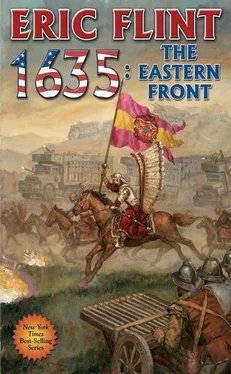Eric Flint - 1635 - The Eastern Front
Здесь есть возможность читать онлайн «Eric Flint - 1635 - The Eastern Front» весь текст электронной книги совершенно бесплатно (целиком полную версию без сокращений). В некоторых случаях можно слушать аудио, скачать через торрент в формате fb2 и присутствует краткое содержание. Жанр: Альтернативная история, на английском языке. Описание произведения, (предисловие) а так же отзывы посетителей доступны на портале библиотеки ЛибКат.
- Название:1635: The Eastern Front
- Автор:
- Жанр:
- Год:неизвестен
- ISBN:нет данных
- Рейтинг книги:5 / 5. Голосов: 1
-
Избранное:Добавить в избранное
- Отзывы:
-
Ваша оценка:
- 100
- 1
- 2
- 3
- 4
- 5
1635: The Eastern Front: краткое содержание, описание и аннотация
Предлагаем к чтению аннотацию, описание, краткое содержание или предисловие (зависит от того, что написал сам автор книги «1635: The Eastern Front»). Если вы не нашли необходимую информацию о книге — напишите в комментариях, мы постараемся отыскать её.
1635: The Eastern Front — читать онлайн бесплатно полную книгу (весь текст) целиком
Ниже представлен текст книги, разбитый по страницам. Система сохранения места последней прочитанной страницы, позволяет с удобством читать онлайн бесплатно книгу «1635: The Eastern Front», без необходимости каждый раз заново искать на чём Вы остановились. Поставьте закладку, и сможете в любой момент перейти на страницу, на которой закончили чтение.
Интервал:
Закладка:
Eric Flint
1635: The Eastern Front
Prologue
The Upper Vogtland
June 1635
"They've passed on, Georg," said Wilhelm Kuefer, as soon as he came down the ladder. "I think those soldiers are just deserters, on their way out of Saxony altogether. Probably see no reason to get ground under the Swede's boot."
Georg Kresse nodded. "Probably. If they're some of Holk's men, almost certainly. All those thugs were ever good for was savaging unarmed civilians. The last thing they want is to get caught in a real war."
Neither Kresse nor Kuefer bothered to whisper. This far into the abandoned tin mine that Georg Kresse and his people had taken over as a base of operations, there was no chance that anyone outside the mine could hear him. Kuefer could have shouted and not been noticed by anyone in the open.
That was one of the advantages of using the mine. It offset the many disadvantages, among which darkness and dampness ranked high on Kuefer's list.
Wilhelm had had no trouble seeing Kresse nodding, though. The problem wasn't darkness in itself. They had plenty of lamps, donated to them by their supporters and sympathizers in the Vogtland. The problem was that the oil lamps emitted fumes, which, given the poor air circulation in the mine, added to the problems caused by cooking fires. Whenever they could, Kresse's people did their cooking outside, but that option wasn't always possible.
They did have one "flashlight," as the smokeless American lamp was called, but it was no longer operating. The device required "batteries" to operate, and by the time they made that discovery-by exhausting the energies of said batteries-it was too late to do anything about it. Kresse's agents had made inquiries, to see if the batteries could be replaced. But by now, four years after the Ring of Fire, such batteries had become scarce and extremely expensive. New batteries were being manufactured, they'd learned, using a combination of up-time knowledge and available down-time techniques. They even worked, by all accounts. But they were reportedly much too large and cumbersome to be fit into the slender flashlight.
So, the once-delightful gadget was now useless. It wouldn't even make a very good club. But they kept it anyway, less as a memento than something in the way of a symbol for the future.
That more or less summarized their general attitude toward Americans. For Georg Kresse and his followers in the Vogtland, as for rebels throughout the Germanies-throughout all of Europe, for that matter-the real importance of the up-timers was mostly symbolic rather than practical. Like most such rebel groups, they'd had no significant direct contact with the Americans.
That was hardly surprising. There had only been three and a half thousand Americans to begin with, right after the Ring of Fire had transported their town of Grantville through time back into the seventeenth century. By now, five hundred or so of those had died. Some of the deaths had been casualties of war, and others had resulted from epidemics. For the most part, though, the deaths had been a simple product of human realities. The population of Grantville had been disproportionately elderly, and many of those old people had relied on up-time medicines to stay alive. Most of those medicines had vanished after the Ring of Fire. Now perched in the middle of what the up-timers called the Thirty Years' War, the death rate among those of them who were elderly or sickly had been severe. From the standpoint of the seventeenth century, they'd been living on borrowed time.
The number of Europeans, or even Germans and Bohemians, who had actual relations with the Americans was comparatively minuscule. True, up-time technology was spreading much more widely and rapidly than the up-timers themselves. But, for most people, that technology was still on a level with Kresse's flashlight: one or two minor gadgets. Even an up-time rifle was nothing more than a temporarily handy gadget, in the long run, except insofar as it could be at least partially duplicated.
For all of their partiality toward the up-timers, there were some things about the Americans that irritated Kresse and his people. What they'd heard of them, rather. Except for Anna Piesel, none of them had ever met an American in person, and Anna's contact had been brief and incidental. She'd literally bumped into the man as he came out of a tavern she was entering in Saalfeld. He'd said "Excuse me," in heavily accented Amideutsch, and gone on his way.
The great gift the up-timers had given rebels throughout the Germanies-indeed, throughout Europe-was simply being living proof that rebellion against the established order was not only possible and justified but even, you might say, ordained by history. The biggest irritant was that the Americans seemed to assume, blithely, ignorantly, and arrogantly, that they needed to bring the word of revolution to the benighted and backward Germans. That was a bit absurd as well as aggravating, given that the Germanies had had more in the way of rebellions and revolts over the past two centuries than the Americans had ever experienced. Just to name one example, their leader Georg Kresse was the descendant of one of the leaders of the Peasant War a century ago.
Nor were those two Kresses unusual. Another relative-Hans Kresse, one of Georg's cousins-had been one of the leaders in the town of Mehla when they drove out the soldiers who'd been occupying it.
It was a minor irritant, however-and there was always the possibility that the attitudes of the Americans had become distorted in the process of being passed on. Here in the mountains of the Vogtland, in southwestern Saxony, Kresse and his rebels had been isolated from the developments that had swept over Thuringia and the northerly Germanies after the Ring of Fire. To add to the problems, the enemy against whom they were fighting, the elector of Saxony, John George, had been officially an ally of the Americans and the Swedes. True, the alliance hadn't been a very friendly one, even before John George betrayed Gustav Adolf at the start of the Ostend War. Still, it had apparently been enough for the up-timers to keep a distance from Saxon rebels.
Happily, that situation was now ending. Emperor Gustav Adolf's long-expected invasion of Saxony and Brandenburg was imminent, and that would transform the entire situation. Kresse and his people had hopes that, thereafter, the more admirable qualities of the up-timers would come to the fore.
But that remained to be seen. In the meantime, Georg Kresse had business to attend to. He turned to Kuefer. "Summon the men, Wilhelm."
Kuefer didn't bother to ask why. Given Kresse, the answer was a foregone conclusion. He was a harsh man, when all was said and done. There was no way he would allow a band of deserters from Holk's army to pass through the Upper Vogtland unpunished.
There were certain obligations involved, as well. Heinrich Holk was one of the worst examples of the sort of condottiere who had risen to prominence during the long wars since the Austrian emperor defeated the Bohemian Protestants at the Battle of the White Mountain in November of 1620. He'd been born into a family of Danish Protestants, but had switched his faith and allegiance to the Habsburgs when that suited his advancement as a professional soldier. He'd switched allegiance again and sided with Wallenstein when he seized power in Bohemia.
Not satisfied with a mere triple-cross, Holk then tried to stab Wallenstein in the back by seizing and plundering Prague when Wallenstein led his army out to confront the Austrians at the second battle of the White Mountain. But he'd been foiled by an alliance of up-timers and the large Jewish community in Prague. Upon hearing that a victorious Wallenstein was on his way back to Prague, Holk had immediately fled north to Saxony, where he'd offered the services of his army to the Saxon elector, John George.
Читать дальшеИнтервал:
Закладка:
Похожие книги на «1635: The Eastern Front»
Представляем Вашему вниманию похожие книги на «1635: The Eastern Front» списком для выбора. Мы отобрали схожую по названию и смыслу литературу в надежде предоставить читателям больше вариантов отыскать новые, интересные, ещё непрочитанные произведения.
Обсуждение, отзывы о книге «1635: The Eastern Front» и просто собственные мнения читателей. Оставьте ваши комментарии, напишите, что Вы думаете о произведении, его смысле или главных героях. Укажите что конкретно понравилось, а что нет, и почему Вы так считаете.












